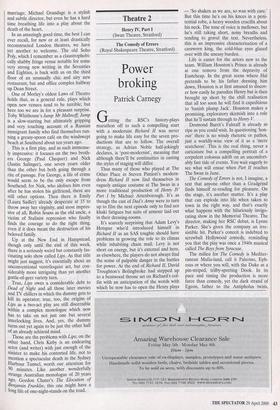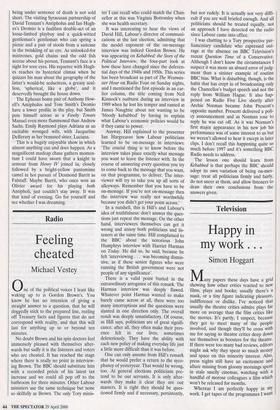Theatre 2
Henry IV, Part I (Swan Theatre, Stratford)
The Comedy of Errors (Royal Shakespeare Theatre, Stratford)
Power broking
Patrick Car n egy Getting the RSC's history-plays marathon off to such a compelling start with a modernist Richard II was never going to make life easy for the seven pro- ductions that are to follow. The overall strategy, as Adrian Noble half-jokingly declares, is 'post-modernist', meaning that although there'll be continuities in casting the styles of staging will differ.
Thus many of those who played at The Other Place in Steven Pimlott's modern- dress Richard II now find themselves in vaguely antique costume at The Swan in a more traditional production of Henry IV Part I by Michael Attenborough. It's as though the cast of Dad's Army were to turn up to film the next episode only to find not khaki fatigues but suits of armour laid out in their dressing-rooms. It's scarcely surprising that Adam Levy's Hotspur who'd introduced himself in Richard II as an SAS toughie should have problems in growing the role to its climax while inhabiting chain mail. Levy is not short on energy, but it's external and here, as elsewhere, the players do not always find the sense of palpable danger in the battles for power. At the end of Richard II, David Troughton's Bolingbroke had stepped up to a bentwood throne set on Richard's cof- fin with an anticipation of the words with which he now has to open the Henry plays — 'So shaken as we are, so wan with care.' But this time he's on his knees in a peni- tential robe, a heavy wooden crucifix about his neck. The tone of voice is mellower, but he's still taking short, noisy breaths and tending to gravel the text. Nevertheless, this is an impressive characterisation of a careworn king, the cold-blue eyes glazed over with the uneasy burden.
Life is easier for the actors new to the team. William Houston's Prince is already at one remove from the depravity of Eastcheap. In the great scene where Hal pretends to be his father dressing him down, Houston is at first amused to discov- er how easily he parodies Henry but is then brought up short by the chill realisation that all too soon he will find it expeditious to 'banish plump Jack'. Houston makes a promising, exploratory skirmish into a role that he'll sustain through to Henry V.
Desmond Barrit's Falstaff is already as ripe as you could wish. In questioning 'hon- our' there is no windy rhetoric or pathos, just a worldly-wise view of it as a 'mere scutcheon'. This is the real thing, never a caricature but a compelling portrait of a corpulent colossus adrift on an uncomfort- ably fast tide of events. You wait eagerly to see what will ensue when Part II reaches The Swan in June.
The Comedy of Errors is not, I imagine, a text that anyone other than a Gradgrind finds himself re-reading for pleasure. On the stage, it's another matter. It's a play that can explode into life when taken to town in the right way, and that's exactly what happens with the hilariously invigo- rating show in the Memorial Theatre. The director, making her RSC debut, is Lynne Parker. She's given the company an irre- sistible hit. Parker's conceit is indebted to screwball Hollywood comedy, reminding you that the play was once a 1940s musical called The Boys from Syracuse.
The milieu for The Comedy is Mediter- ranean Mafia-land, call it Palermo, Eph- esus or where you will, with the Duke as a pin-striped, trilby-sporting Dook. In its pace and timing the production is more farce than comedy, yet the dark strand of Egeon, father to the Antipholus twins, being under sentence of death is not sold short. The visiting Syracusan partnership of David Tennant's Antipholus and Ian Hugh- es's Dromio is a faultless double-act of an loose-limbed playboy and a quick-witted gentleman's gentleman who can spring a picnic and a pair of stools from a suitcase in the twinkling of an eye. As unlooked-for mistresses, gold chains and the odd fish accrue about his person, Tennant's face is a sight for sore eyes. His repartee with Hugh- es reaches its hysterical climax when he quizzes his man about the geography of the latter's would-be seductress, a greasy scul- lion, 'spherical, like a globe', and it deservedly brought the house down.
The Ephesus home pair of Anthony How- ell's Antipholus and Tom Smith's Dromio have a lower profile in the play, but Smith puts himself across as a Fawhy Towers Manuel even more flummoxed than Andrew Sachs. Emily Raymond plays Adriana as an excitable wronged wife, with Jacqueline Defferary as her bemused sister, Luciana.
This is a hugely enjoyable show in which almost anything can and does happen. As a magnificent madcap chase gathers momen- tum I could have sworn that a knight in armour from Henry IV joined in, closely followed by a bright-yellow pantomime camel in hot pursuit of Desmond Barrit as Falstaff. Maybe Barrit, who once won an Olivier award for his playing both Antipholi, just couldn't stay away. It was that kind of evening. Go for yourself and see whether I was dreaming.



























































 Previous page
Previous page